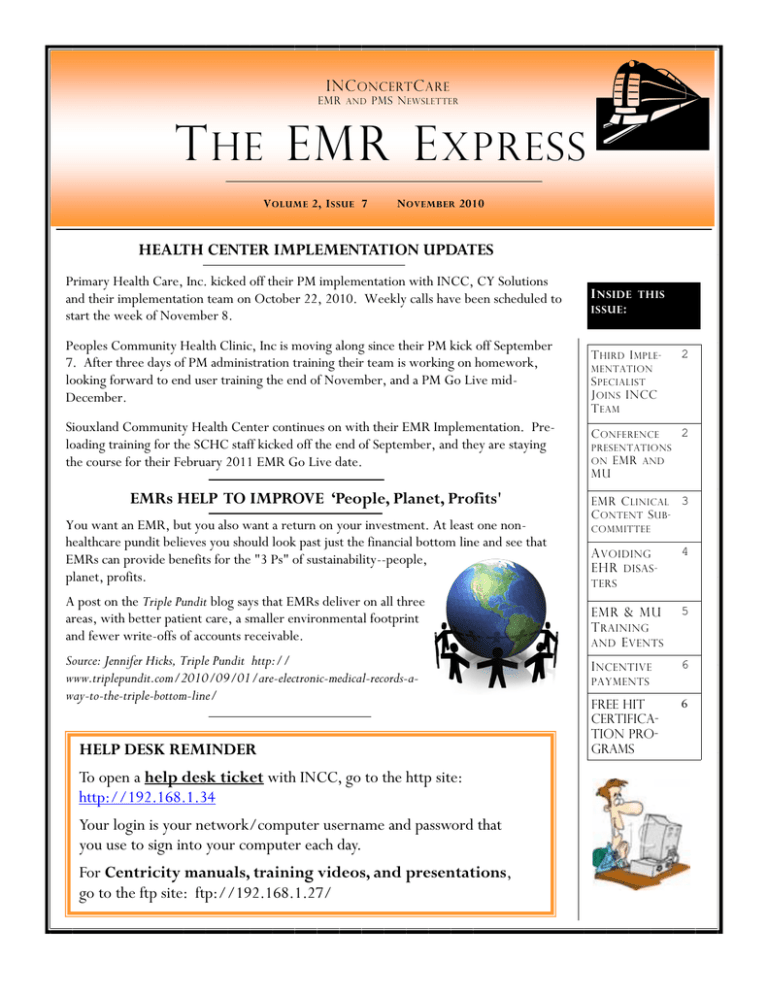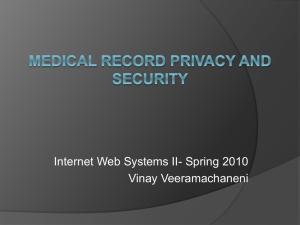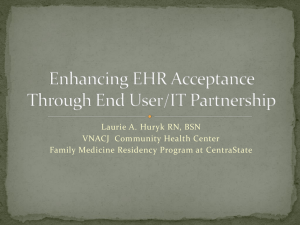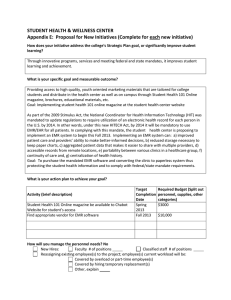the emr express - Iowa Primary Care Association
advertisement

INC ONCERT C ARE EMR AND PMS N EWSLETTER T HE EMR E XPRESS V OLUME 2, I SSUE 7 N OVEMBER 2010 HEALTH CENTER IMPLEMENTATION UPDATES Primary Health Care, Inc. kicked off their PM implementation with INCC, CY Solutions and their implementation team on October 22, 2010. Weekly calls have been scheduled to start the week of November 8. Peoples Community Health Clinic, Inc is moving along since their PM kick off September 7. After three days of PM administration training their team is working on homework, looking forward to end user training the end of November, and a PM Go Live midDecember. Siouxland Community Health Center continues on with their EMR Implementation. Preloading training for the SCHC staff kicked off the end of September, and they are staying the course for their February 2011 EMR Go Live date. EMRs HELP TO IMPROVE „People, Planet, Profits' You want an EMR, but you also want a return on your investment. At least one nonhealthcare pundit believes you should look past just the financial bottom line and see that EMRs can provide benefits for the "3 Ps" of sustainability--people, planet, profits. A post on the Triple Pundit blog says that EMRs deliver on all three areas, with better patient care, a smaller environmental footprint and fewer write-offs of accounts receivable. Source: Jennifer Hicks, Triple Pundit http:// www.triplepundit.com/2010/09/01/are-electronic-medical-records-away-to-the-triple-bottom-line/ HELP DESK REMINDER To open a help desk ticket with INCC, go to the http site: http://192.168.1.34 Your login is your network/computer username and password that you use to sign into your computer each day. For Centricity manuals, training videos, and presentations, go to the ftp site: ftp://192.168.1.27/ I NSIDE THIS ISSUE : T HIRD I MPLE- 2 MENTATION S PECIALIST J OINS INCC T EAM C ONFERENCE 2 PRESENTATIONS ON EMR AND MU EMR C LINICAL 3 C ONTENT S UBCOMMITTEE A VOIDING EHR DISAS- 4 TERS EMR & MU T RAINING AND E VENTS 5 I NCENTIVE 6 PAYMENTS Free HIT Certification programs 6 P AGE 2 T HE EMR E XPRESS T HIRD I MPLEMENTATION S PECIALIST R OUNDS O UT T EAM Kyle Pedersen has joined the INCC staff to assist Kyle Haindfield and Jennifer Cox as a third implementation specialist. Kyle started on September 20, 2010 and has plunged right in to getting to know the needs of the centers and adding GE Centricity to his repertoire. Kyle comes to us from Allscripts/Eclipsys where he was an Implementation/Professional Services Consultant for more than 3 years, having worked with clinics and practices in 38 states to implement EMR and PMS solutions. Kyle brings a background of clinical workflow and implementation experience, as well as PM and coding experience to the team, and will be attending Alliance training to gain exposure to our model. Kyle has a Bachelors of Science in Training & Development from Iowa State University. Kyle lives in Clive, and in his spare time, you will find Kyle enjoying snow sports in Colorado, getting his hands dirty with service projects and leadership development locally and around the midwest, and always being in the loop with great restaurants and live music. Kyle Pedersen can be reached at kpedersen@ianepca.com or at 515-333-5027. 2010 IA/NEPCA ANNUAL CONFERENCE PRESENTATIONS AVAILABLE The Iowa Nebraska Primary Care Association’s Annual Conference was held at Honey Creek Resort in Rathbun, Iowa on October 28-29, 2010. Several sessions related to the topic of electronic medical records. To review all presentations provided to IA/NEPCA from this conference, go to: http://www.ianepca.com/ news_and_events/2010_annual_conference_presentations.php Two sessions of particular importance include: "The Patient-centered Medical Home and the Future of American Medical Care" - Dr. Ed Wagner "Achieving Meaningful Use of Certified Electronic Medical Records" - Kim Downs, IFMC Kim Downs, RN, CPHQ, Senior Direction of Operations at IFMC reminded us of the MU Clinical Quality Measures: Hypertension: Blood Pressure Measurement Preventive Care and Screening Measure Pair: a) Tobacco Use Assessment b) Tobacco Cessation Intervention Adult Weight Screening and Follow‐up Weight Assessment and Counseling for Children and Adolescents Preventive Care and Screening: Influenza Immunization for Patients 50 Years Old or Older Childhood Immunization Status Seiji Hayashi, MD, MPH, Chief Medical Officer for HRSA BPHC also discussed the importance of health centers use of electronic medical records and meeting the meaningful use measures. P AGE 3 V OLUME 2, I SSUE 7 INCC/ALLIANCE EMR CLINICAL CONTENT SUBCOMMITTEE THE WORK ADVANCES Health center staff have been consistently meeting over the past year to review clinical content and protocols in the GE Centricity product as well as the additions and revisions created by the Alliance of Chicago. INCC and the Alliance of Chicago have been working with the continual leadership, input and guidance of INCC health centers. Often there has been one, if not two, meetings each month. The next meetings are scheduled for Thursday, November 11 and December 9, 2010. All meetings run from noon – 1:30 pm CT. INCC provides the dial-in # and web meeting details in advance of the calls with a reminder and the applicable materials. To facilitate this process, there are many health center clinicians who agreed to serving as a subject matter experts on the content areas still needing to be reviewed. Content areas still to be discussed include: geriatrics, alcohol screening, and telephone nursing, including IV fluid administration, medication administration and triage. We appreciate the continued feedback provided by each center on these calls and for the review of content and protocols with all providers at each center. All centers, regardless of your EMR vendor, are welcome to review the clinical protocols identified and agreed upon through this process. In general people are accepting of the content/protocols, yet have questions about the process, flow and the visual aspects of the information in the EMR. Clinical content areas discussed to date includes: Asthma age less than 5 yrs Pediatric well-child, including EPSDT Asthma age 5-99 Adult Preventive Care HIV male and female Cardiovascular/Hypertension Chronic Pain Management OB Adult depression Hepatitis C Diabetes Behavioral Health Participation in this subcommittee is open to all. Let Deb Kazmerzak or Dawn Gentsch at IA/NEPCA know if you are interested in being added to the subcommittee distribution list. Two-Year HIT Degrees are available through: Des Moines Area Community College http://www.dmacc.edu/welcome.html Eastern Iowa Community College District http://www.eicc.edu/ Iowa Lakes Community College http://www.iowalakes.edu/ Indian Hills Community College http://www.indianhills.edu/ Metropolitan Community College http://www.mccneb.edu/ Northeast Iowa Community College-Calmar http://www.nicc.edu/ Northwest Iowa Community College http://www.nwicc.edu/ P AGE 4 T HE EMR E XPRESS AVOIDING EHR DISASTERS 1. Leadership and support from the top – Successful EHR implementation requires absolute support from upper management within an organization. Support needs to be unwavering throughout the inevitable “ups” and “downs” of project implementation. 2. Physician Champions and EHR advocates – In order to ensure success, physician and other clinician EHR champions should be identified and recruited. Physician champions serve as the positive driving force for EHR implementation. 3. Set unified goals and realistic expectations for change management – Define objectives up front, and stick to those goals. Workflow changes using an EHR are inevitable and people need to be patient and realize that the transition to an EHR may not be smooth, but in the long run will pay off. Strive for compromise among clinicians in defining common goals. 4. Avoid “vapor ware” – If choosing a vendor system, make sure that the selected vendor system can deliver what it promises by talking to other clients. You do not want to be the beta test site for promised functionality that does not really exist. Be wary of functionality that exists in the “next release of code” or the “next system upgrade” that is not due for several months. Do not believe it unless you can see it. 5. Project management – Effective implementation is dependent upon utilizing a project manager who can coordinate all aspects of the implementation, from hardware to software to testing and training, across clinicians, administrative staff, IT staff and the vendor/s. This individual needs to be an effective communicator dedicated to all aspects of the EHR project. 6. Map out an implementation timeline with flexibility expected – Choose a timeline for implementation milestones with the realization that dates can change. It is important to focus on specific deliverables due by specific dates. If deadlines are offset in an egregious manner, then the project should be reassessed for any serious problems that would prevent success. 7. Involve clinicians and staff in the decision-making process – Involve front line physicians, nurses, and other support staff in the EHR implementation, including the system selection process, workflow definition and process redesign. Engage physician staff in the design of EHR components such as order sets, flow sheet views and documentation templates. Keep people up to date with implementation tasks and progress. 8. Avoid “Scope creep” – Do not be thrown off by requests for added features or functionality that were not part of the original change management goals. Table or “park” those items for post implementation prioritization and review. Freely adding on to the scope of the originally defined work plan creates extra tasks and confusion that may not be attainable within the defined timeframe for implementation. Scope creep throws people off from their goals. 9. Test, Test, Test – The value of testing cannot be underestimated when implementing an EHR. Hardware setup needs to be tested. It is absolutely essential to test new workflows within the context of the new EHR software. Engage front line staff in the testing process well in advance of the EHR go-live date. 10. Train, Train, Train – Successful EHR implementation requires thorough staff training. Tailor training to meet the needs of office staff based on their experience with computers and their role within the organization. Training does not end with the first day of system go-live. Create a group of staff who are system “superusers” that others can go to for immediate assistance, and who can serve as point people for system and process issues that develop post go-live. In Partnership with: The Office of the National Coordinator for Health Information Technology (ONC) U.S. Department of Health and Human Services grant 90RC0004/01. IA-HITREC-05/10-021 Reprinted by INCC with permission from IFMC. P AGE 5 V OLUME 2, I SSUE 7 EMR TRAINING & EVENTS (upcoming and archived) The IFMC Health Information Technology Regional Extension Center offers a monthly webinar training. The past trainings are available online at no cost. http://www.iowahitrec.org/news_events Upcoming sessions include: Project Management: Change is a Positive Thing 11/30/2010 Noon CST Discover how to create a project plan and engage the key stakeholders in your project. Includes how to prepare staff, keep the team on target, set goals, and accomplish milestones. Evaluation and Improvement: Optimizing EHR Benefits 01/25/2011 Discuss how to conduct a post –EHR implementation, evaluation and impact analysis. Explore improvement opportunities to meet meaningful use criteria. Health Information Exchange: Protecting Your Patient and Your Organization 02/22/2011 Discuss best practice guidelines to ensure health information privacy and security in an electronic environment. All live and archived webinars are free. Register at www.IowaHITREC.org Moving Towards Meaningful Use Wednesday, December 1, 2010 ~ 10:00 a.m. - 3:45 p.m. CT Holiday Inn - Kearney, Nebraska Wide River Technology Extension Center (TEC), Nebraska’s Regional Extension Center, invites you to join Health Information Technology and Health Information Management professionals from around the state for this informative one-day program. Designed to focus on meaningful use, health information exchange, Health Insurance Portability and Accountability Act (HIPAA) and accelerating project management, there is sure to be a number of valuable takeaways from this event. The cost to attend is $25.00, which is the cost for food and beverages during the event. Registrations are nonrefundable, but are transferable to another person in the same clinic. Go to http://www.widerivertec.org/home/eventregistrationform.aspx and fill out the online form. You will then be sent a confirmation e-mail with instructions on how to submit payment for attending this event. RSVP by Wednesday, November 24, 2010 Questions? Contact Jennifer Rathman, Communications Manager, at jrathman@widerivertec.org or 402.476.1700 P AGE 6 T HE EMR E XPRESS 9943 Hickman Rd. Suite 103 Urbandale, Iowa 50322 Phone: 515.244.9610 Fax: 515.243.3566 V ISIT Fall Leaves U S O N L I N E AT : WWW. IANEPCA. COM “Meaningful Use of Fall Leaves” FREE HIT CERTIFICATE TRAINING PROGRAM‟S AVAILABLE AT IA and NE COMMUNITY COLLEGES Seventy community colleges from across the nation received funding for the new HIT program, part of a larger $144 million HHS award from the American Recovery and Reinvestment Act of 2009. In the Midwest 17 community colleges in ten states have formed the Midwest Community College Health Information Technology Consortium. "The institutions receiving awards will develop necessary roadmaps to help health care providers and hospitals implement and effectively use electronic health records,” said Dr. David Blumenthal, national coordinator for the HHS initiative. The new non-credit certification targets health industry professionals and is part of President Barack Obama’s requirement that every U.S. citizen have an electronic medical record by 2014. The goal is to make health care more efficient, transferable and reduce errors. These programs provide short-term training in specific roles that will support the implementation of electronic health records. The curriculum focuses on job specific training in six workforce roles to support implementation of EHR. These certificate programs can provide you with the skills, confidence and connections you will need to thrive in the HIT field. We recommend that applicable health center staff register and obtain this certification. The DMACC Health IT Certificate Program will provide training in four roles that have been identified: 1. Implementation Support Specialist, 2. Implementation Manager, 3. Technical/Software Support Staff, and 4. Trainers. A completed application with a $25.00 registration fee is required. Courses start every 30 days and it is estimated to take six months to complete the certificate. To learn more about the DMACC HIT Certificate program.http:// go.dmacc.edu/programs/health/healthinfotech/Pages/welcome.aspx The Kirkwood Community College Certificate Program is set up in a similar manner. Follow this link to learn more: http://www.kirkwood.edu/site/index.php?d=1034 Metropolitan Community College in Omaha, NE was also funded and their first cohort started in September. Tuition is free for qualified applicants. http://www.mccneb.edu/hitp/ See page 3 of this newsletter for links to Iowa community colleges that offer a 2 year AAS degree in HIT



